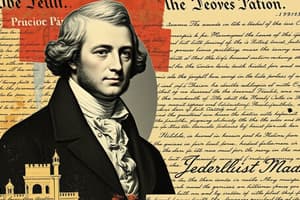Podcast
Questions and Answers
Who proposed the Virginia Plan?
Who proposed the Virginia Plan?
- Alexander Hamilton
- James Madison (correct)
- Thomas Jefferson
- George Washington
What was required for the ratification of the Constitution?
What was required for the ratification of the Constitution?
9 out of 13 states needed to accept it.
Federalists supported stronger state governments over a central government.
Federalists supported stronger state governments over a central government.
False (B)
The presiding officer of the Constitutional Convention was _____.
The presiding officer of the Constitutional Convention was _____.
What was the main argument of the Anti-Federalists?
What was the main argument of the Anti-Federalists?
What compromise combined the Virginia and New Jersey plans?
What compromise combined the Virginia and New Jersey plans?
The 3/5 Compromise counted each slave as 3/5 of a person for representation.
The 3/5 Compromise counted each slave as 3/5 of a person for representation.
Which event demonstrated the federal government's authority over states?
Which event demonstrated the federal government's authority over states?
Who is known as the 'Father of the Constitution'?
Who is known as the 'Father of the Constitution'?
What did the Federalist Papers aim to achieve?
What did the Federalist Papers aim to achieve?
What concept limits the powers of the federal government?
What concept limits the powers of the federal government?
Thomas Jefferson supported strong central government.
Thomas Jefferson supported strong central government.
The first ten amendments to the Constitution are called the _____.
The first ten amendments to the Constitution are called the _____.
Flashcards are hidden until you start studying
Study Notes
Virginia Plan
- Drafted by James Madison, aimed for a robust national legislature.
- Proposed legislative selection of executive and judiciary positions.
- Benefitted populous states by allocating representatives based on state size.
Ratification
- Ratification by states followed the inclusion of a bill of rights.
- New York and Virginia were among the final states to ratify.
- Required acceptance from 9 out of 13 states to enact the constitution.
Federalists
- Supported a more powerful central government over state power.
- Coastal merchants favored trade relations with Britain post-Revolution.
- Key figures included Hamilton and Madison; promoted government necessity through newspapers.
Federalist Papers
- Collection of essays by John Jay, Hamilton, and Madison under the pseudonym Publius.
- Aimed to counter anti-federalist arguments from figures like Cato and Brutus.
- Emphasized the benefits of national governance detailed in the new constitution.
Slavery Question
- Constitution mandated the cessation of the slave trade/importation by 1808.
- Northern delegates acknowledged Southern opposition to constitutional interference with slavery.
- Slaves were utilized in tax and representation calculations despite lacking rights.
Important Compromises
- Created the Electoral College to facilitate presidential election through popular votes.
- Established a four-year presidential term to limit executive power.
- Ensured Congress controlled interstate commerce, preventing state taxation on each other.
Connecticut Compromise
- Merged elements of the Virginia and New Jersey Plans, satisfying both large and small states.
- Proposed a bicameral legislature: a population-based House of Representatives and a Senate with two senators from each state.
- Formulated by the "grand committee," chaired by Ben Franklin, and introduced by Roger Sherman.
3/5 Compromise
- Established that each slave would be counted as three-fifths of a person for representation.
- Enabled slave states to count two slaves as one person for representative allocation.
- Slaves were also considered for tax assessments in states that practiced slavery.
Anti-Federalists
- Led by Jefferson, opposed the constitution for lack of transparency and demanded a bill of rights.
- Favored an alliance with France and an agrarian-based society.
- Believed in power resting with ordinary people rather than a wealthy elite; organized against Federalists at the state level.
James Madison
- Known as the "Father of the Constitution" for his key role in its development.
- Authored Federalist Papers and proposed constitutional amendments to limit federal power.
- Wrote the Virginia Plan, which served as a foundational blueprint for the Constitution.
Important Agreements
- Emphasized the separation of powers among legislative, executive, and judicial branches.
- Adopted a republic model of limited representation, restricting state power in coining money.
New Jersey Plan
- Proposed equality in state representation with each state receiving one vote in Congress.
- Advocated by William Paterson to protect the interests of smaller states.
- Intended for a unicameral legislature with a weak executive branch.
George Washington
- Presided over the Constitutional Convention and was unanimously elected the first U.S. president in 1789.
- His presence lent credibility to the proceedings; he supported the Constitution's ratification.
- Advocated for a stronger national government following Shays' Rebellion to maintain order.
Alexander Hamilton
- Proposed the Annapolis Convention in 1786 to address weaknesses in the Articles of Confederation.
- Promoted the idea of paying back debts through investments from wealthy citizens.
- Advocated for an industrialized economy, the creation of a national bank, and taxation to protect American manufacturing.
Thomas Jefferson
- Believed in the necessity of rebellion to maintain liberty, famously stating it should be "fertilized with the blood of patriots."
- Did not sign the Constitution due to absence but later criticized it for centralizing government power.
- Served as Secretary of State under Washington and was a leader of the Anti-Federalists.
Whiskey Rebellion
- Farmers in Pennsylvania revolted against the excise tax on whiskey, similar to colonial resistance to British taxation.
- George Washington, advised by Hamilton, led federal troops to suppress the rebellion.
- Established a precedent for federal authority over state disobedience to federal laws.
American Neutrality
- Evolved post-French Revolution as France engaged in conflict with Great Britain.
- The U.S. faced British seizures of ships and forced enlistment of sailors due to perceived ties with France.
- Diplomatic engagements like John Jay's treaty aimed to alleviate tensions with Britain while Thomas Pinckney's treaty benefited U.S. access to New Orleans.
Fall of the Federalists
- John Adams, succeeding Washington, faced political challenges including tensions with France.
- The XYZ Affair escalated tensions, leading to calls for war, and resulted in an undeclared "quasi-war."
- The Alien and Sedition Acts restricted French immigration and criticized opposition, undermining Federalist support, while the Virginia and Kentucky resolutions challenged federal supremacy and paved the way for Jefferson's presidency in 1800.
Studying That Suits You
Use AI to generate personalized quizzes and flashcards to suit your learning preferences.




